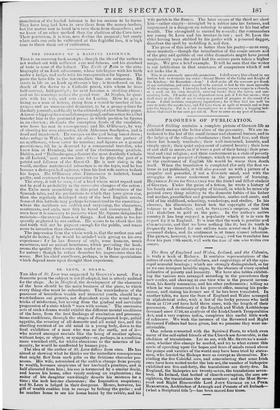THE SORROWS OF A BASHFUL IRISHMAN.
This is an amusing book enough ; though the idea of the author is not worked out with sufficient care and fulness, and his standard of taste is none of the loftiest. The Exile of Erin is the auto- biography of an Irish adventurer, whose tale begins with his birth under a hedge, and ends with his transportation for bigamy. The parts the hero fills in the intermediate time are numerous. He starts in life as an Irish apothecars's boy ; is transferred on the death of the doctor to a Catholic priest, with whom he lives ball-servant, half-pv.)1(146 ; he next becomes a strolling player ; and on lii marriage makes the grand tour. At Naples, he quer- 'els with his w ife, and sets cut for London. Here he gets a lit ing as a man of letters, rising from a would-be teacher of lan- guages and an unsuccessful dramatist, to be a penny-a-liner for the daily journals, and fin ally to the editorship of a low Sunday paper. A horse-whipping for a scandalous paragraph and an action fora libel transfer him to the provincial press; in which position he figures in an election ; abstracts the corruption funds of the candidate, who loses his seat in consequence; and Mr. °Tierney, by way of clearing his own character, libels Alderman Snodgrass, and is fined and imprisoned. He escapes on the gaol being burnt down ; takes refuge in Wah s, under an cues; becomes the partner of an arothecary, whose sister he marries; and figures as a general practitioner, till be is detected by a commercial traveller, who knew him at Humbug, the seat of his electioneering gambols. Dublin, and " Ballinabrogue,a district the most decidedly Catholic in all Ireland," next receive him: where he plays the part of a patriot and follower of the Great 0. He is now risieg in the world, another matrimonial adventure is on the tapis, and he has become a distiuguished agitator, when his first wife arrives to dash his hopes. Mr. OTIarney alias Fitzmaurice is indicted, found guilty, and sentenced to transportation fbr life.
The story, it will be seen, is of a kind where strict regard need not be paid to probability in the successive changes of the action ; the Exile more resembling in this point the adventures of time Spanish tales, and the productions to which they have given rise, than the regularly developed story of the best English novels. Some of this latitude may perhaps be transferred to the execution : where the incidents are sudden and surprising, the characters, sentiments, and style, may fitly be broad and caricatured. But even here it is necessary to preserve what Mr. Square delighted to maintain—the eternal fitness of things. And this rule is too fre- quently neglected by our author. Ile Seems to be afraid that life and truth will not be piquant enough for the public, and trusts more to invention than obsen ation.
The impression frem the whole work is, that the author can and might do better, if he would be satisfied with giving us his own experience : for he has fluency of style, some humour, much smartness, and an animal heartiness, which pervading the book, seems the quality that carries the reader on. He has also an eye for nature ; though be rather describes his impressions than the scene. But his chief excellence, perhaps, is in those speculations which depend more upon thought than experience.
























 Previous page
Previous page